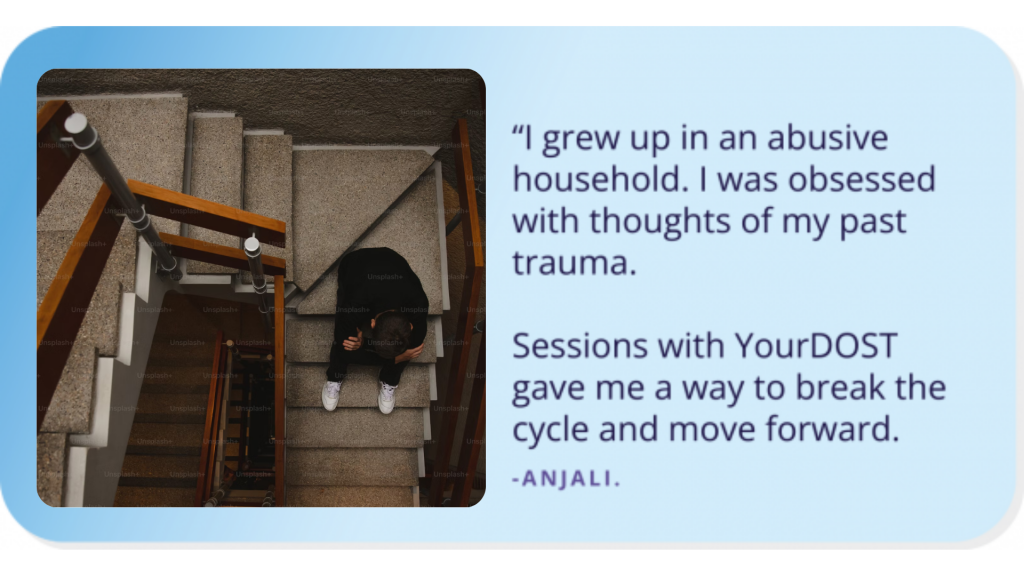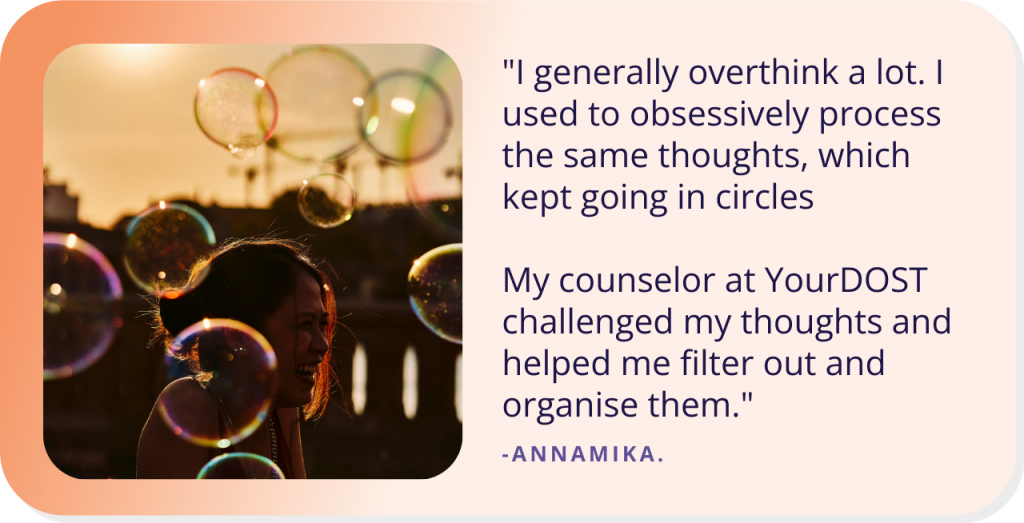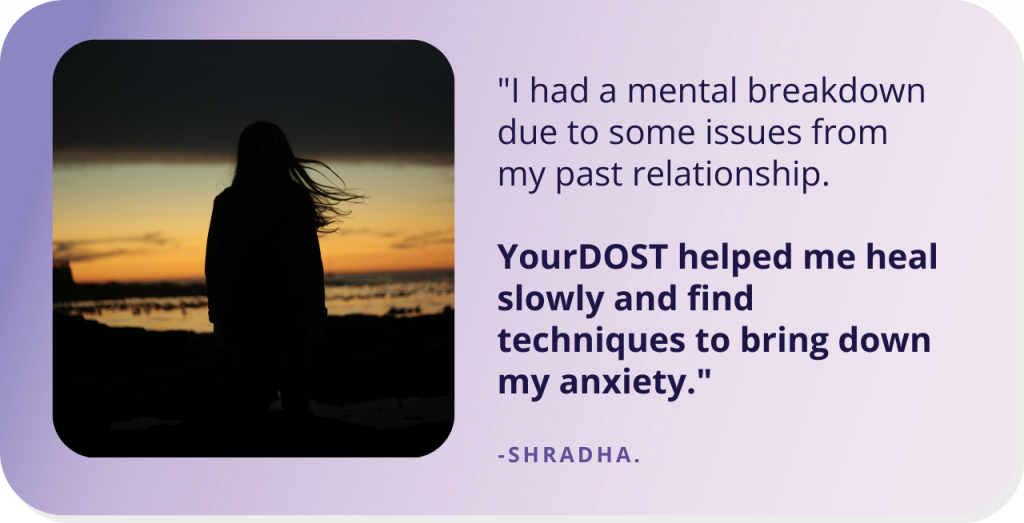Anjali’s Story Of Stepping Out Of Her Unhealthy Household With Counseling

Trigger warning: Domestic abuse & suicidal thoughts
Anjali, a 27-year-old UPSC Aspirant from Hyderabad, is on a mission to experience life to the fullest. She is an MBA graduate and works as a Programmatic Analyst at Annalect, Hyderabad.
Anjali was born in a small village in Andhra. Her family, which included her parents and a brother, moved to Hyderabad to earn a living. She explains that she never had a good relationship with her family, as they are the root cause of every trauma she has gone through.
Anjali elaborates that her father was an alcoholic and ignored the responsibilities of being a husband or a father. Due to this, her mother had to run the family independently, so she started working as a house help for some families. After trying various measures for a while, Anjali’s mom remarried. That was when Anjali began living with her mom and stepfather while her brother went to their grandmother’s house.
Even though Anjali’s stepfather took care of the expenses at home, Anjali says he was abusive, which affected her a lot. Living with them for more than 20 years has emotionally drained Anjali extensively.
When she started working with Annalect, she attended seminars and heard about her company’s partnership with the YourDOST platform. She got a good impression and started taking sessions with the experts available.
The first session felt refreshing for Anjali. She had never shared her past with anybody because she feared being judged. Initially, she shared only work and stress-related issues with the therapist. Still, once she separated from her parents, Anjali said she came forward and shared everything without leaving anything out.
“I have huge dreams for myself, but I was unable to focus on my future or present because of my dysfunctional family. I hesitated to start therapy with YourDOST because I felt disgusted, but I didn’t want to hold back anymore.”
Anjali elaborates that when her mother felt ignored by her father, she started having affairs with multiple partners. At just 6 years old, Anjali couldn’t understand why men visited her home, or why she and her mother went to their houses. Even though the affairs stopped after her mother remarried, Anjali’s stepfather figured out the past due to circumstances, and he started developing suspicions about her mother, which turned the environment hostile for the family.
“My mother told my stepfather about how my father was an alcoholic and unavailable, and he felt bad for us and married her. He also comes from a toxic household; he started abusing me and my brother physically and verbally and used to call it disciplining. Because of that, my brother ran to my grandmother’s house and never returned. After so once he knew about the affairs, things got worse.”
Anjali explains that on a particular day when her stepfather was angry with her mother, he made Anjali bring him a knife from the kitchen to threaten her mother’s life. She adds that it was traumatic because all her life, she used to fear him and did everything he asked her to do.
Anjali explains that her stepfather hated socialising and never allowed her to play with neighbours or have friends. They were so isolated that there weren’t even any other elders to guide her except for the two people she lived with.

“All my childhood, I used to eat, sleep, read and be a witness when my parents took it out on me due to their unstable relationship. We never went to family gatherings, weddings, or funerals. My mother also made me fear making connections with people because she didn’t want me to disclose information about the family to anyone.”
Anjali says her stepfather used to mock and criticise her a lot, which stunned her growth. She explains that her mother made her keep quiet and bear the abuse since he was providing for them.
“I used to think he was a very good person because he took us in, gave us food, and put me in school. Since my father didn’t do all of these, I thought it was saintly of my stepfather. I was unaware that money comes secondary and having a healthy household is more important.”
Anjali explains that she tried to harm herself when she was in third and eighth grade due to all the toxicity at home. She adds that she has always lived with suicidal tendencies, but it became unbearable when after she grew up.
“After I became an adult, I started understanding my family’s mistakes. I have had a heart condition from birth, which had to be treated when I was born itself, but it was only at 25 I went to the doctor and went ahead with the surgery.”
Anjali explains that her mother refused to help her financially during the surgery and pushed her brother, who earns less than Anjali, to take a loan and give it to her. She felt hurt because her mother and her stepfather didn’t take care of Anjali and told her to go back to work right after one month of surgery.
When she was trying to heal, her stepfather repeatedly asked for money from Anjali, and even when she arranged for it, he remained the same and criticised her for everything. Being physically weak too after the heart surgery, Anjali couldn’t take it anymore and asked her father to move out.
“My mother kept asking me to make my stepfather return home. When I disagreed, she left me alone even though I was still in post-op and moved out to be with him. I paid for rent, food and medicines without anybody’s support.”
Anjali says her suicidal tendencies got more intense after the incident. After revealing all these in therapy, Anjali started understanding her patterns and the patterns of her family. She decided to work on her part with complete trust in the process.
“Parents inspire every child, but things weren’t ideal for me. Growing up in a negative environment where I was verbally abused, body shamed and criticised a lot, I developed a lot of self-doubts despite being top of the class.”
Attending the weekly sessions, Anjali felt she was reflecting on what her parents were, not who she was. Anjali explains that she became more self-aware and took various perspectives from the counselors. She realised that she was capable of achieving all along, but it was her stepfather who planted self-doubts and negative emotions in her head.
“I was obsessed with the thoughts of my past, and I couldn’t move forward or focus on my civil service exam preparations. I decided not to be a victim anymore.”
Anjali notes that her life wouldn’t change if she weren’t willing to change. She describes that she decided to try to bring change into her life consciously.
She notes that all her counselors, including her current counselor, Ms Daisy Jagadeshan asked the right questions and employed methods depending on her needs. She gave her various tips like journaling and mindful techniques to break the cycle. Although Anjali is working on breaking out those patterns, she still has a long way to go, according to her. She also says that her self-harming thoughts have stopped completely, and the intensity of the impact of her trauma has reduced as well.
“For more than 20 years, I never knew what happiness was because of my family. I’m determined not to end my life without experiencing the fullest form of happiness.”
After being in therapy for more than ten months now, Anjali is glad that she has a safer environment to share and express herself. She is thankful that her counselors listen to her without prejudice and try to help her in every way possible.
As she rates herself 3 out of 5, Anjali adds that even though breaking her cycle is hard, she will succeed. After a few months, she assured us we would contact her to show us that she did it! We feel proud of her journey with us and appreciate her optimism. We have faith in Anjali and that she will keep evolving and ravaging more in the future.
Anjali’s Warrior Tips:
1.“Awareness about mental health should be from school, as people with mental health issues are still judged.”
2.“Psychologists should be equal to doctors in creating a safer environment for people; Better mental health is a must-have criterion for a better standard of living.”
3.“Be open to other’s perspectives and understand where they come from.”
Are you someone who has gone through a difficult phase and emerged stronger and better, with some professional help? Share your story with us to encourage thousands of others who might be struggling. click here to submit your story.







